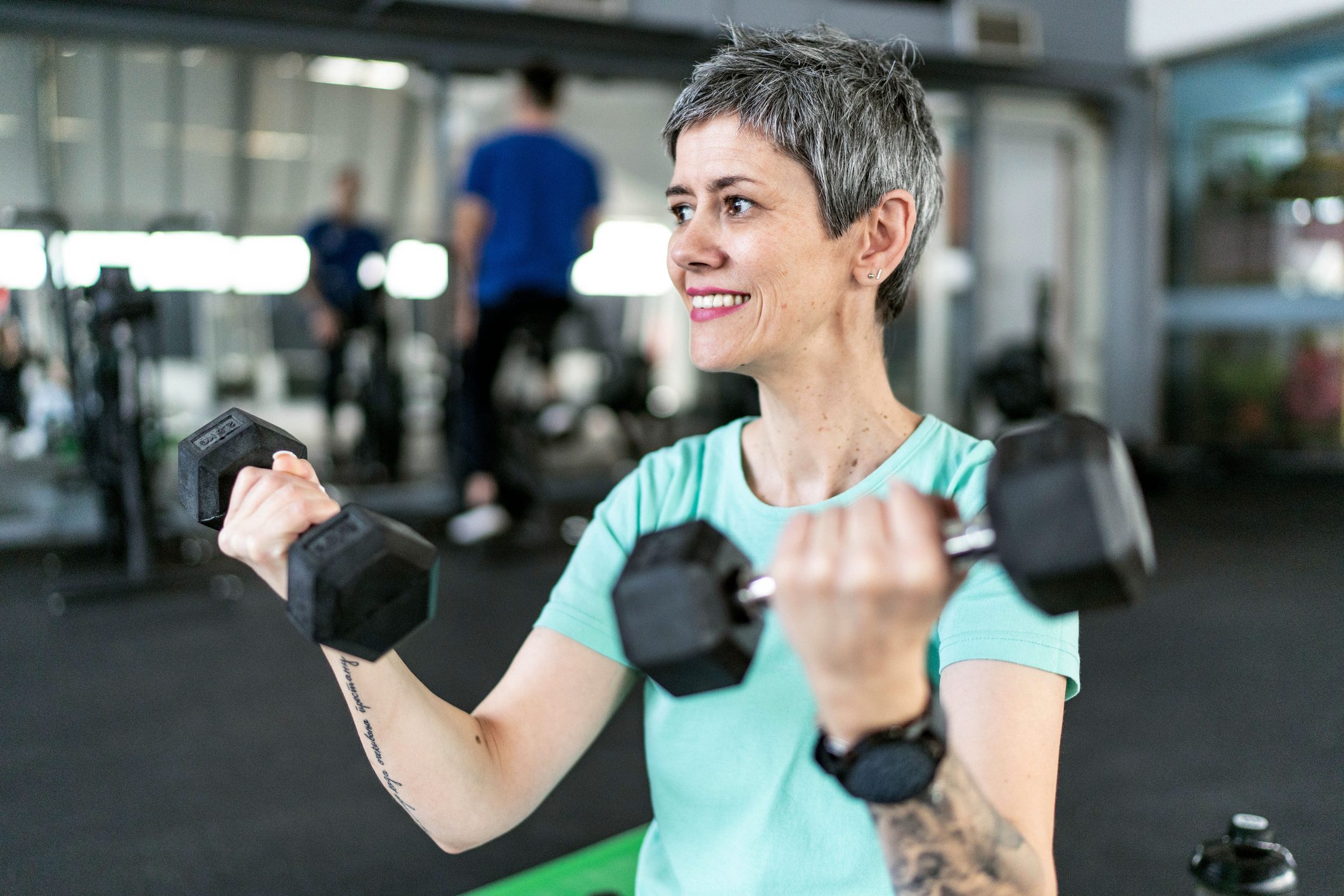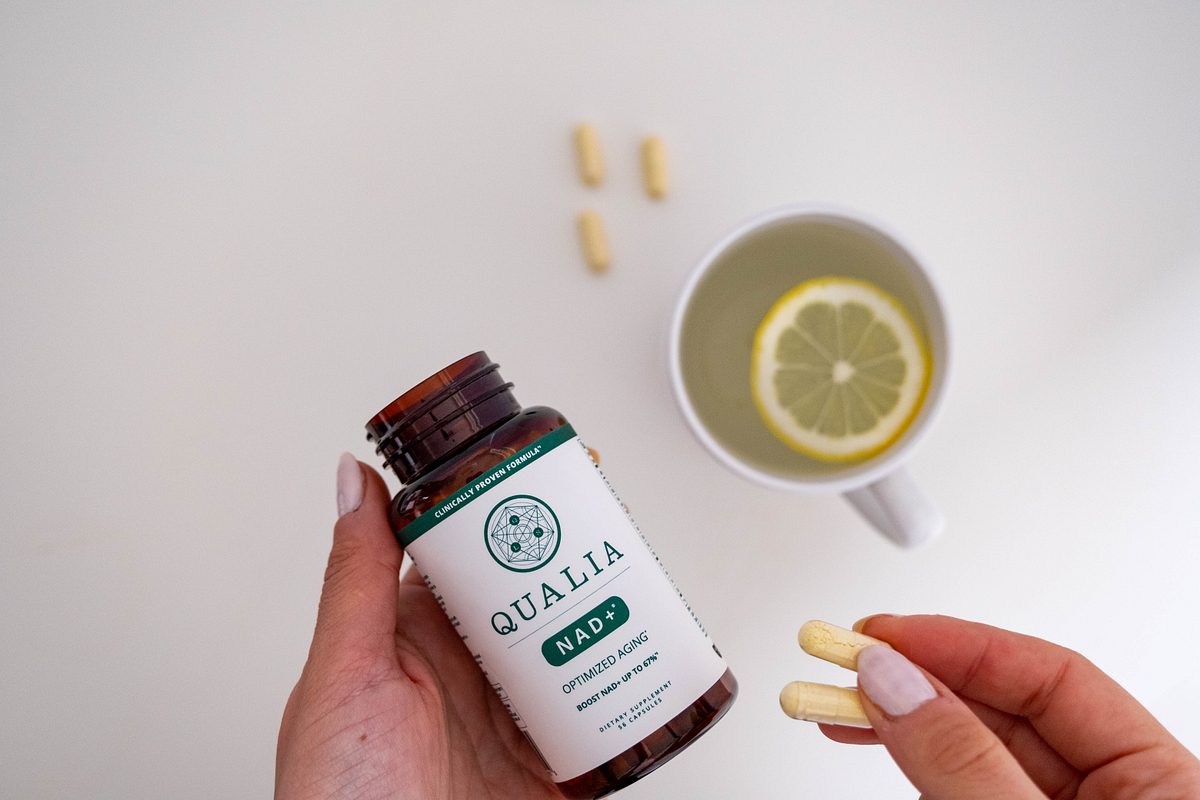Muscles are more than just for looks—they are your fountain of youth. Beginning around age 30, muscle mass naturally declines by 3-8% per decade due to reduced hormone levels and decreased physical activity.1 Without regular resistance training, you could lose 4-6 pounds of muscle every ten years, leading to decreased strength and endurance.2 This loss makes daily tasks more challenging and increases your risk of falls and injuries.
The Natural Decline of Muscle Mass and Strength with Age
Sarcopenia, the age-related decline in muscle mass and strength, begins subtly in your 30s but accelerates over time, posing significant health risks.3
Reduced muscle mass slows your metabolism, leading to weight gain and an increased risk of metabolic syndrome—a cluster of conditions that elevate your chances of heart disease, stroke, and type 2 diabetes. Weaker muscles also compromise stability, raising the likelihood of falls, fractures, and long-term disability, while contributing to poor posture, decreased activity, and social isolation, which can lead to depression.4-7
However, this decline isn’t inevitable. By focusing on preserving and building muscle mass and strength through resistance training, you can maintain your mobility, independence, and ease in daily activities. This proactive approach not only helps you stay active and reduce the risk of osteoporosis and fractures but also allows you to age powerfully, enjoying a higher quality of life.
5 Ways Muscle Can Help You Live a Healthier, Longer Life
Muscle is like metabolic Spanx—firming, tightening, and toning while driving a host of health benefits that go beyond just physical strength.
Strong muscles enhance mobility and independence, lower your risk of falls and injuries, and are closely linked to better bone density, reducing your risk of osteoporosis. Additionally, regular muscle-building activities increase your energy and stamina, making everyday tasks easier and improving your quality of life.8-10
Here are five compelling reasons why maintaining muscle is crucial for aging powerfully, boosting longevity, and living a more vibrant, active life.
1. Muscle Optimizes Your Metabolism
Increasing muscle mass boosts your metabolic rate because muscle tissue requires more energy to maintain than fat tissue. A higher metabolic rate aids weight management and improves insulin sensitivity, helping to stabilize blood-sugar levels. Additionally, muscle promotes the release of hormones like growth hormone, which supports fat metabolism.11-13 Together, these benefits reduce the risk of chronic diseases and promote a longer, more active life.
2. Muscle Can Help Prevent Disease
Strong muscles can help reduce your risk of chronic conditions and improve cardiovascular health. By maintaining and building muscle mass, you enhance circulation because muscles need a steady supply of oxygen and nutrients. This strengthens your heart and lowers the risk of heart disease.14, 15
Muscle health also enhances how your body handles sugar, increasing insulin sensitivity and reducing the risk of type 2 diabetes.16 Additionally, weight-bearing exercises and strength training stimulate bone growth and increase bone density, lowering your risk of osteoporosis and fractures.17 This becomes especially important as you age, helping to maintain mobility and reduce the likelihood of debilitating injuries.
3. Muscle Can Make Your Immune System Stronger
Strong muscles are crucial for a healthy immune system. Maintaining muscle mass helps control chronic inflammation, reducing the risk of illness and enhancing your body’s ability to fight infections. Muscles also produce myokines, immune-boosting molecules that play a vital role in your body’s defense mechanisms, making you less susceptible to infections and aiding in quicker recovery from illnesses and injuries. Additionally, well-maintained muscle mass can reduce the risk of autoimmune diseases by managing inflammation, a common trigger for many immune-related issues.18-20
4. Muscle Can Help You Manage Menopause Better
Hormonal changes, including declining estrogen levels during menopause, can lead to muscle loss and increased fat accumulation.21 Maintaining muscle health is crucial to mitigating these effects and enhancing your overall well-being.
Strong muscles help preserve mobility, independence, and quality of life, while also boosting metabolism and improving insulin sensitivity, which can help manage weight and overall hormonal balance.22-24 These combined effects contribute to greater longevity and a healthier, more active life around menopause and beyond.
5. Muscle Supports Mental Health
Maintaining strong muscles and engaging in regular physical activity can significantly boost your mental health by reducing symptoms of anxiety and depression, while also enhancing self-esteem and overall well-being.25, 26
Building and maintaining muscle also improves brain health, helping to preserve memory, attention, and processing speed, which is especially valuable as you age. Muscle health plays a key role in managing mood swings and reducing anxiety, particularly during challenging life stages like menopause.27-29
Resistance Training: Your Key to Building Muscle and Aging Powerfully
Resistance training is essential for building and maintaining muscle mass, promoting longevity, and helping you age powerfully. Lifting heavy weights strengthens muscles, which boosts your metabolic rate, enhances mental health, improves your ability to perform daily activities, and increases overall life satisfaction. This is especially beneficial once you reach 40 and during menopause, helping you better handle mood swings and other symptoms associated with this transition.
Ready to get started? My Resistance Training Cheat Sheet provides everything you need to begin your journey. It includes home gym essentials, an 8-week workout plan, and a progress tracker to monitor your sets, reps, and weights with each workout.
Get your FREE Resistance Training Cheat Sheet here.
References:
- Volpi E, Nazemi R, Fujita S. Muscle tissue changes with aging. Curr Opin Clin Nutr Metab Care. 2004 Jul;7(4):405-10. doi: 10.1097/01.mco.0000134362.76653.b2. PMID: 15192443; PMCID: PMC2804956.
- Harvard Health: Age and muscle loss
- Cleveland Clinic: Sarcopenia (Muscle Loss): Symptoms & Causes
- Better Health Channel: Metabolism
- Rodrigues F, Monteiro AM, Forte P, Morouço P. Effects of Muscle Strength, Agility, and Fear of Falling on Risk of Falling in Older Adults. Int J Environ Res Public Health. 2023 Mar 11;20(6):4945. doi: 10.3390/ijerph20064945. PMID: 36981854; PMCID: PMC10048873.
- Better Health Channel: Posture
- Better Health Channel: Osteoporosis and exercise
- Mayo Clinic: Strength training: Get stronger, leaner, healthier
- Han H, Chen S, Wang X, Jin J, Li X, Li Z. Association between muscle strength and mass and bone mineral density in the US general population: data from NHANES 1999-2002. J Orthop Surg Res. 2023 Jun 1;18(1):397. doi: 10.1186/s13018-023-03877-4. PMID: 37264353; PMCID: PMC10233893.
- Healthline: 14 Benefits of Strength Training, Backed by Science
- Harvard Health: Can you increase your metabolism?
- Merz KE, Thurmond DC. Role of Skeletal Muscle in Insulin Resistance and Glucose Uptake. Compr Physiol. 2020 Jul 8;10(3):785-809. doi: 10.1002/cphy.c190029. PMID: 32940941; PMCID: PMC8074531.
- Vijayakumar A, Yakar S, Leroith D. The intricate role of growth hormone in metabolism. Front Endocrinol (Lausanne). 2011 Sep 27;2:32. doi: 10.3389/fendo.2011.00032. PMID: 22654802; PMCID: PMC3356038.
- Harvard Health: Use strength training to help ward off chronic disease
- Cleveland Clinic Health Essentials: How Making Your Heart Work Harder Makes It Stronger
- Healthline: How to Prevent Blood Sugar Spikes
- Harvard Health: Strength training builds more than muscles
- Medical News Today: Exercise your muscles to combat chronic inflammation
- Science Daily: Muscles support a strong immune system
- Science Direct: The anti-inflammatory effects of exercise on autoimmune diseases: A 20-year systematic review
- Kodoth V, Scaccia S, Aggarwal B. Adverse Changes in Body Composition During the Menopausal Transition and Relation to Cardiovascular Risk: A Contemporary Review. Womens Health Rep (New Rochelle). 2022 Jun 13;3(1):573-581. doi: 10.1089/whr.2021.0119. PMID: 35814604; PMCID: PMC9258798.
- Mishra N, Mishra VN, Devanshi. Exercise beyond menopause: Dos and Don’ts. J Midlife Health. 2011 Jul;2(2):51-6. doi: 10.4103/0976-7800.92524. PMID: 22408332; PMCID: PMC3296386.
- Capel-Alcaraz AM, García-López H, Castro-Sánchez AM, Fernández-Sánchez M, Lara-Palomo IC. The Efficacy of Strength Exercises for Reducing the Symptoms of Menopause: A Systematic Review. J Clin Med. 2023 Jan 9;12(2):548. doi: 10.3390/jcm12020548. PMID: 36675477; PMCID: PMC9864448.
- Human Kinetics: Strength training during menopause offers multiple benefits
- Mayo Clinic: Depression and anxiety: Exercise eases symptoms
- Mahindru A, Patil P, Agrawal V. Role of Physical Activity on Mental Health and Well-Being: A Review. Cureus. 2023 Jan 7;15(1):e33475. doi: 10.7759/cureus.33475. PMID: 36756008; PMCID: PMC9902068.
- Quigley A, MacKay-Lyons M, Eskes G. Effects of Exercise on Cognitive Performance in Older Adults: A Narrative Review of the Evidence, Possible Biological Mechanisms, and Recommendations for Exercise Prescription. J Aging Res. 2020 May 14;2020:1407896. doi: 10.1155/2020/1407896. PMID: 32509348; PMCID: PMC7244966.
- NY Times: How Exercise Strengthens Your Brain
- Mishra N, Mishra VN, Devanshi. Exercise beyond menopause: Dos and Don’ts. J Midlife Health. 2011 Jul;2(2):51-6. doi: 10.4103/0976-7800.92524. PMID: 22408332; PMCID: PMC3296386.
These statements have not been evaluated by the Food & Drug Administration. Products mentioned are not intended to diagnose, treat, cure, or prevent any disease. The views in this blog by JJ Virgin should never be used as a substitute for professional medical advice. Please work with a healthcare practitioner concerning any medical problem or concern.






